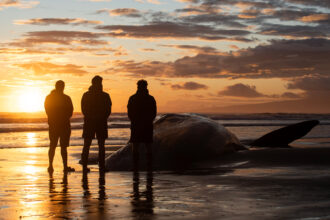Stay informed about the latest climate, energy and environmental justice news by email. Sign up for the ICN newsletter.
Jeffrey Bossert Clark, a lawyer who has repeatedly challenged the scientific foundations of U.S. climate policy and was part of a legal team that represented BP in lawsuits stemming from the nation’s worst oil spill, the 2010 Deepwater Horizon disaster, was nominated by President Donald Trump on Tuesday to serve as the Justice Department’s top environmental lawyer.
Clark, a partner in the Washington, D.C., office of Kirkland & Ellis, has represented the U.S. Chamber of Commerce in lawsuits challenging the federal government’s authority to regulate carbon emissions. In court he has repeatedly argued that it is inappropriate to base government policymaking on the scientific consensus presented by the Intergovernmental Panel on Climate Change.
“When did America risk coming to be ruled by foreign scientists and apparatchiks at the United Nations?” Clark demanded in a 2010 blog posting on the EPA’s endangerment finding.
Clark was prominently involved in industry challenges to the EPA’s “endangerment finding” that set the scientific basis for all subsequent attempts to regulate greenhouse gases, including from autos and industrial sources. It was a demonstration of opposition to the underpinnings of the whole Obama administration regulatory approach to carbon dioxide, which were consistently upheld by the Supreme Court.
One of the legal briefs he signed is such a comprehensive compendium of thoroughly debunked denial of the scientific consensus that it stands as a classic of the genre, replete with condemnations not just of the EPA but of the IPCC, whose work the petitioners tried to persuade the court to rule out of bounds. A series of podcasts and papers he has written on The Federalist Society website continue his arguments against the endangerment finding and climate science more broadly.
“He has a long history of opposing climate action for corporate and ideological clients,” said David Doniger, who heads the climate and clean air program at the Natural Resources Defense Council, after learning of Clark’s nomination. “I would expect that history would require him to recuse himself from such cases as over the Clean Power Plan, where he filed an amicus brief against the rule.”
In one case Clark presented on behalf of the Chamber of Commerce, a brief argued that, under Obama-era policies, starting with the endangerment finding, “hundreds of billions and possibly trillions will be drained from the American economy based on novel legal theories marking “a significant shift of power from the Legislative Branch to the Executive Branch.”
The brief said that the legal basis of carbon controls under the Clean Air Act “generated what quite likely are the costliest regulations ever promulgated based on EPA’s belief that it can take a red pencil to plain statutory text”— an argument that resonates through Trump administration policies to this day.
“EPA asserted a new regulatory jurisdiction over essentially every energy-consuming building and activity in the nation, all the way down to houses of worship, neighborhood bakeries, and private homes,” the brief said.
In 2007, shortly after the Supreme Court ruled in the case that established the endangerment finding, Clark spoke to the American Enterprise Institute, saying the finding was where the court “erred most significantly.”
“They wanted to be able to compel the agency to determine whether CO2 and other greenhouse gas emission were causing or contributing to climate change,” he said. “They didn’t have that procedural right. At every possible turn, though, they attempted to pitch their case that way and it would seem the Supreme Court bought into that.”
Clark also successfully defended BP in a legal challenge brought by Louisiana parishes over the company’s multi-billion settlement of claims stemming from the Deepwater Horizon oil spill in the Gulf of Mexico, according to his law firm. He was involved in the fight against the U.S. government to obtain documents regarding officials’ deliberations over how fast the oil was flowing. The size of the oil spill, which was deeply underestimated at first, was crucial to determining the penalties that BP might face.
Clark served in the George W. Bush administration from 2001 to 2005 as deputy assistant attorney general for the Environment and Natural Resources Division of the Justice Department. His nomination to become assistant attorney general for the same department in the Trump administration will require Senate confirmation.
InsideClimate News reporter Georgina Gustin contributed to this report.
About This Story
Perhaps you noticed: This story, like all the news we publish, is free to read. That’s because Inside Climate News is a 501c3 nonprofit organization. We do not charge a subscription fee, lock our news behind a paywall, or clutter our website with ads. We make our news on climate and the environment freely available to you and anyone who wants it.
That’s not all. We also share our news for free with scores of other media organizations around the country. Many of them can’t afford to do environmental journalism of their own. We’ve built bureaus from coast to coast to report local stories, collaborate with local newsrooms and co-publish articles so that this vital work is shared as widely as possible.
Two of us launched ICN in 2007. Six years later we earned a Pulitzer Prize for National Reporting, and now we run the oldest and largest dedicated climate newsroom in the nation. We tell the story in all its complexity. We hold polluters accountable. We expose environmental injustice. We debunk misinformation. We scrutinize solutions and inspire action.
Donations from readers like you fund every aspect of what we do. If you don’t already, will you support our ongoing work, our reporting on the biggest crisis facing our planet, and help us reach even more readers in more places?
Please take a moment to make a tax-deductible donation. Every one of them makes a difference.
Thank you,













